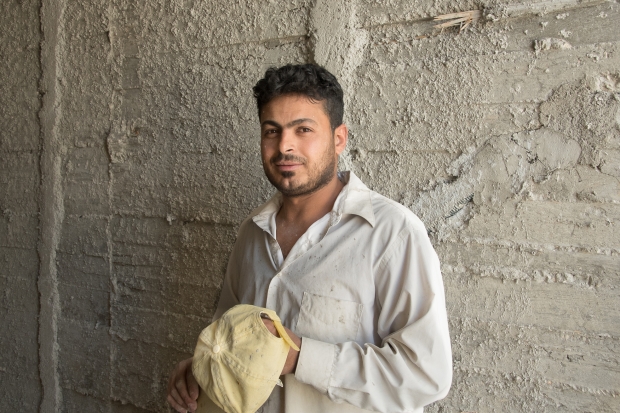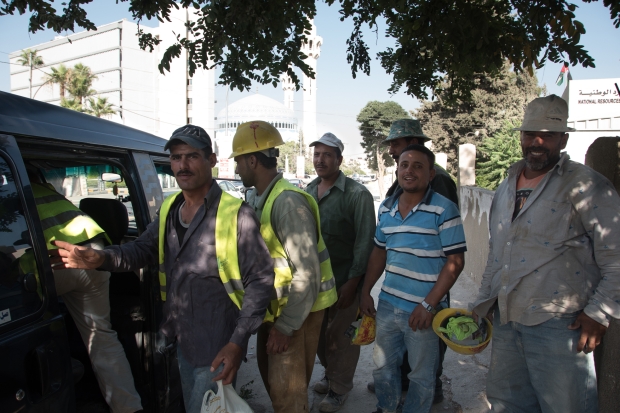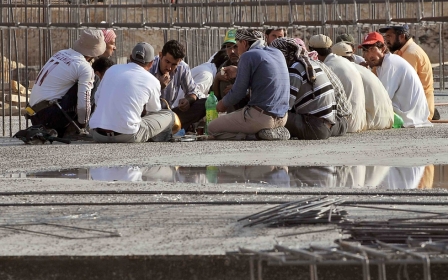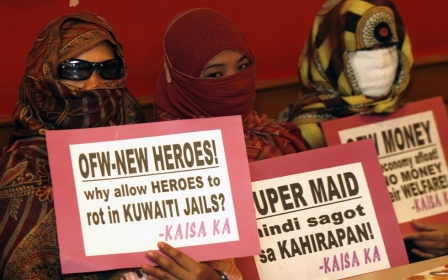Egyptian workers face clampdown in Jordan as Syrians join labour market
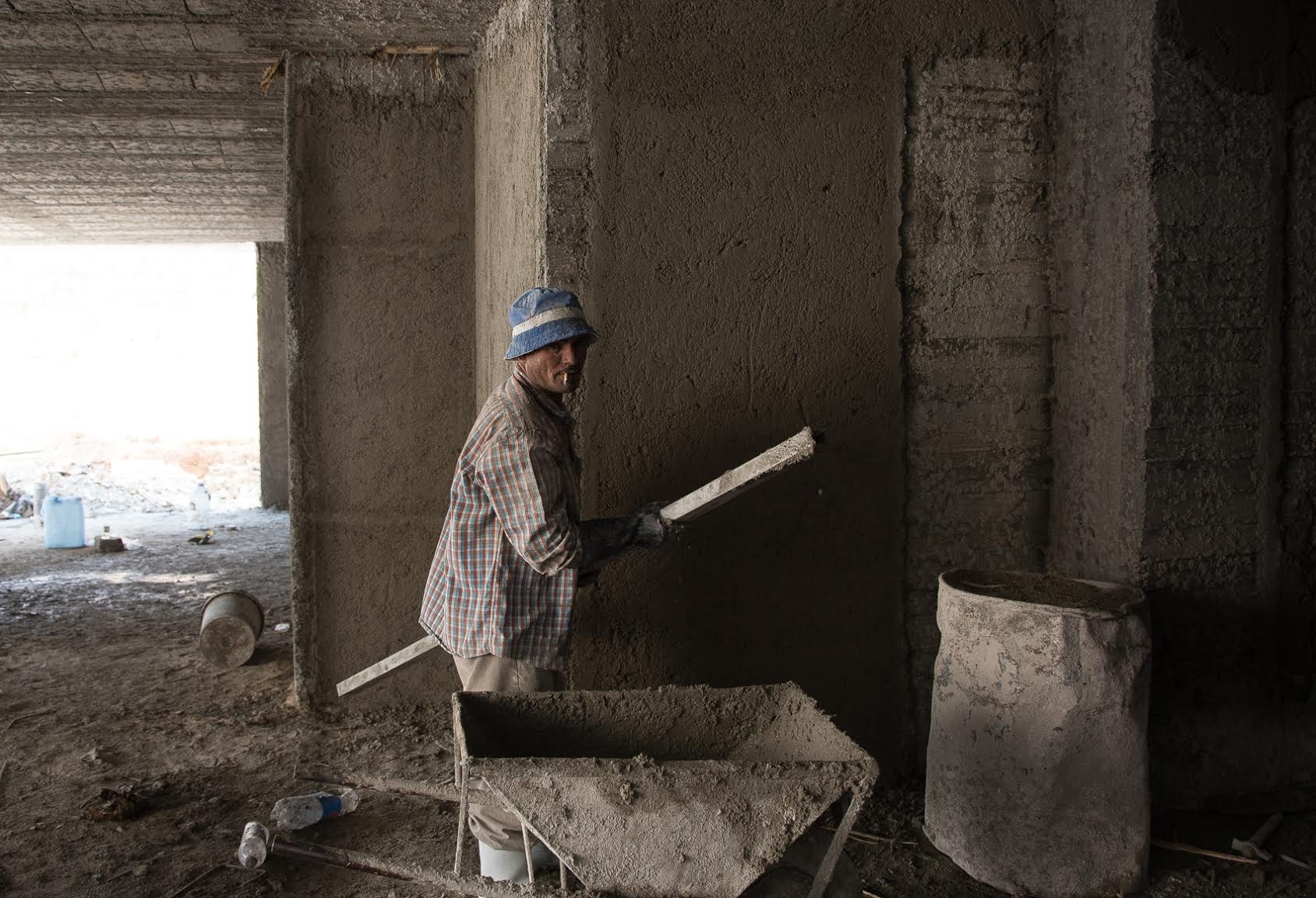
AMMAN - “Our biggest struggles here now are with the police,” Abdel Naby said.
Naby is an Egyptian construction worker who has been living in Jordan for 11 years. “We’re working here illegally,” he said, while mixing concrete and spreading it on the walls of an unfinished building in suburban Amman.
“We’re all from the same village in Tanta,” he added. Familial ties and friendship brought him and other Egyptian workers to Jordan. Naby said they were brought in to work in agriculture, but after becoming fed up with poor working conditions, the Egyptians sought employment in other sectors.
He intends to head back to Egypt in the next two or three months. “We don’t come here to start our own business projects or to build ourselves up. We come here to save the bare minimum to get married or to support our families.”
His concerns are echoed by other Egyptian migrant workers in Jordan.
'Chaos and competition' in Jordan's labour market
Since a donors' conference in London last February, in which Jordan pledged to grant 200,000 work permits to Syrian refugees over the next three years, the country has been tightening restrictions on Egyptian workers.
In June, the Ministry of Labor announced that Jordan will stop recruiting foreign migrant labour, except for domestic workers. According to the statement on the ministry's website, the decision was made in order to “organise and assess the local labour market”. It added that the new policy aims to address “market imbalances, especially the agricultural sector,” as workers are “leaking” out of agriculture and into other sectors.
The labour ministry attributed the move to “the consequences of the Syrian refugee crisis and the entry of large numbers of Syrian refugees to the labour market”.
This, the ministry says, has “led to widespread unemployment in the ranks of Jordanian workers in the provinces and in all sectors”.
So far, 25,000 Syrians have been granted work permits, a number that is “extremely low” compared with the number of Syrians working informally, which is somewhere between 100,000 and 150,000, according to Linda al-Kalash, the director of Tamkeen, a legal aid and support centre for migrant workers.
The number is also insignificant when considering the number of Syrians living in Jordan, who, Kalash said, “should be allowed to work as long as they are living here”.
The Ministry of Labour said in July that there are 800,000 foreign migrant workers in Jordan, and only about 300,000 have unexpired work permits. Sixty-five percent of the migrant workers are Egyptian.
A study conducted by the Swiss Agency for Development and Cooperation (SADC), cited official figures stating that the total number of migrant workers, including the undocumented ones, was about 400,000 at the end of 2012. However, in November 2013, the SADC also said that local Jordanian newspapers reported that there were 1.5 million migrant workers in Jordan, mostly Egyptian and Syrian nationals.
Kalash said Jordan’s labour market is becoming steadily entangled with more “chaos and complications”. Egyptians are allowed to reside in Jordan without visas, and “Syrians will not leave because they are refugees, so the decision was made against Egyptian workers,” Kalash said.
While some Egyptian workers told Middle East Eye they have noticed more competition from new Syrian workers, others said the market seemed unaffected.
“It’s usually just Egyptians who work in construction,” Naby said, “so there is not much competition.” He added that the case may be different for those who work in restaurants, cafes and shops, where competition between Syrian and Egyptian workers is probably more intense.
“The situation is different for them, after all; may God be with them; they don’t have the option even to go back to their country. They are refugees. We can go back.”
Khaled Ahmed, an older Egyptian construction worker who has been in Jordan for more than 20 years, agreed that there was little competition from Syrians. “We work in different fields,” he said.
At a construction site in Amman where a hospital is to be built, Mohamed Dawud, a Jordanian manager who oversees the work, said: “We don’t hire any Syrians because they don’t have work permits, and we don’t hire anyone without a permit.
“We hire Egyptians who work in other sectors, then we try to switch their permits.”
Ill-treatment and agricultural sector ‘leaks’
Since the 1970s, and even more so in the 1980s, Egyptian workers have been going to Jordan to work in agriculture and construction, Kalash said.
She said the agricultural sector is easiest for foreign labourers to get work permits, but it is more prone to violations.
“[Egyptian workers] come here under the impression that they are free to work in any sector, and of course they find the reality different,” Kalash said. “So they leak into other sectors, which Jordanians also do not work in … the sectors that require a lot of hard, physical labour.
“A large number of Egyptians, we can say, are deceived somehow with their contracts and recruitment,” she said. This is particularly so when there is a middleman between the worker and the Jordanian employee.
Mohamed al-Khatib, the ministry spokesman, said at least 100,000 workers have left the agricultural sector to work in other fields. He said in a statement that the decision to stop the recruitment of foreign migrant workers came in light of economic losses for the state and rising unemployment among Jordanian nationals. The Jordanian government is fulfilling its “duties” in finding and arresting unregistered workers, he said.
Mahmoud Hegazy, who now works as a doorman in an upper-class neighbourhood of Amman, said he only worked in the agricultural sector until he found a way out. “It isn’t worth it. You’ll be making 200 dinars [$282] a month. It barely covers your own expenses. What is the point of coming here then?”
Many also complain that they find themselves at the mercy of their employers. According to a Tamkeen report on migrant labour, “Tamkeen lawyers recall many cases when the migrant worker faced deportation just because his employer filed a complaint against him, even if the complaint was filed out of spite.”
Increased likelihood of arrest
These factors make arrest and deportation, which Tamkeen says is often arbitrary, a major concern for most workers.
As a migrant worker, “you have to take abuse and keep quiet,” said Ramadan Mahdy, another Egyptian labourer who has also been working in Jordan for more than a decade.
Next to him stood a younger worker, Yehia Reda, who has been in Jordan for two months and asked to be referred to by a pseudonym.
Reda, like hundreds of others, came with an agriculture work permit but decided to work in construction. “I paid 1,000 dinars [$1,400] to come here, and I have to make up for that.”
In the short time he has been in Jordan, he has already learned to avoid the police. “They’ll take anyone. I was with a friend who had a construction work permit and they took him anyway. I have an agriculture work permit and I managed to run away.”
He said migrant workers have to be alert, even when eating lunch or sleeping. “The police can come at any time.”
While there is no unified database for the arrests and deportations of migrant workers, Ahmed Awad, the director of the Phenix Center for Economic and Informatics Studies, said that roughly 5,000 Egyptian migrant workers have been deported since the beginning of the year for not having work permits.
“If Egyptian workers were already vulnerable and living in precarious situations, the Jordanian government’s resolution at the international donors conference in London to issue work permits to 200,000 Syrians (at no cost to employers) within two years further exacerbated the situation,” Awad told MEE in an e-mail.
“Three people were killed last week because they were running from the police,” said Ahmed el-Sayed, an Egyptian construction worker in Amman. “They were working at a construction site when the police came, and in an attempt to escape they jumped from the third floor and eventually died.”
People may get detained for a week or more before being deported. “Why? What’s the point?” he asked. Mahdy asked a similar question: “Why take me to jail? Why not just take me straight home?”
‘The problem goes back to Egypt’
At the end of the day, Naby said there was a consensus among Egyptian workers that “the problem goes back to Egypt.
“We’re leaving and looking for work abroad because of the bad economic conditions and the corruption in our own country,” he said.
While Jordan has been calling on the Egyptian embassy in Amman to “raise awareness among Egyptians of the importance of having work permits that protect them and guarantee their rights,” Egyptian workers maintain that their embassy is largely useless.
“The ambassador is just sleeping and eating mansaf [a popular Jordanian dish],” said Ayman Shaheen, an Egyptian worker in suburban Amman.
“We’ve held strikes before, but no one does anything.”
“The embassy is garbage,” another worker said. “I went there and it feels like you're talking to the mukhabarat [intelligence service].”
Middle East Eye propose une couverture et une analyse indépendantes et incomparables du Moyen-Orient, de l’Afrique du Nord et d’autres régions du monde. Pour en savoir plus sur la reprise de ce contenu et les frais qui s’appliquent, veuillez remplir ce formulaire [en anglais]. Pour en savoir plus sur MEE, cliquez ici [en anglais].


